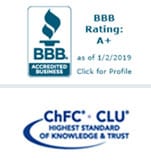
1. Max Out Your Contributions
There’s still time to max out the contributions on your retirement account. Making the maximum contribution to your IRA or 401(k) boosts savings and reduces your taxable income. In 2019, contribution limits increased to $19,000 for 401(k)s and $6,000 for IRAs and Roth IRAs. If you’re over 50, you can contribute as much as $25,000 to your 401(k) and up to $7,000 to your IRA.
Along with your retirement accounts, maxing out contributions to your HSA or Health Savings Account can reduce your tax bill. In fact, HSAs have a triple tax benefit: contributions, growth, and withdrawals all occur tax-free as long as the money is used for eligible healthcare expenses.
2. Prepare for Tax Season
We know: no one wants to think about taxes before April. However, there are several key steps you can take before December 31st to increase your refund or reduce your tax payments. If you owed money last April, examine your withholding. The IRS changed its withholding tables in 2018 as part of the new tax law. However, many Americans failed to adjust their withholding, leading to higher taxes and lower refunds.
This is also the best time to start gathering relevant tax documents such as bank statements, property tax receipts, and charitable donations. Don’t miss out on these other refund-boosting tax planning tips.
3. Mark Your Calendar for Open Enrollment
You can enroll in your employer’s healthcare plan from November 1st to December 15th. This is also an opportunity to switch plans, make adjustments to your policy, or make other changes to your benefits.
If you qualify for Medicare, open enrollment runs from October 15th to December 7th. If you have a Medicare Supplement or Medigap policy, we suggest reviewing it each year with a licensed Medicare professional as benefits can and do change. Any adjustments to your plan will go into effect January 1st, 2020. Check out our guide to Medicare Open Enrollment.
4. Plan for Next Year
As the days get shorter and temperatures drop, find some time to grab a mug of hot apple cider with your spouse or partner and review your long-term plan. If you’re approaching retirement, make sure you have a Social Security strategy, a plan to pay for healthcare, and a withdrawal plan. Already retired? Take a look at your expenses to make sure your spending is on track.
A sound retirement plan incorporates everything from income sources, to budgeting and tax planning. It’s important to review your plan annually with a trusted fiduciary who can help you make any necessary adjustments. At Cowen Tax Advisory Group, we coordinate tax preparation and planning with retirement, investment, and insurance services to produce a truly comprehensive retirement roadmap.


Sara McKinney
saractag@gmail.com
As Cowen Tax Advisory Group’s Digital Content Marketing Specialist, Sara provides in-house copywriting and manages the company’s electronic records system, email marketing, and blog.




